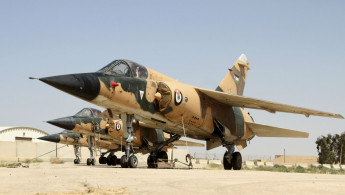Islamic State captures Jordanian pilot in Syria
Jordan's military on Wednesday confirmed that one of its pilots, named as Maaz al-Kassasbeh, was captured by so called Islamic State group after his plane went down in Syria, official news agency Petra said.
Also on Wednesday, a suicide bomber attacked Sunni fighters opposed to the Islamic State group as they gathered Wednesday to receive salaries south of Baghdad, killing at least 26 people, officials said.
Jordanian pilot 'captured'
A monitoring group, the Britain-based Syrian Observatory for Human Rights, confirmed reports that a warplane had been shot down near Raqqa, the northern Syrian city that serves as IS' de-facto capital. They also said that a "(non-Syrian) Arab" pilot had been captured.
Jordan is a member of the anti-IS US-led coalition that began airstrikes against the militant group, which controls vast swathes of Syria and Iraq, three months ago.
No coalition warplanes have previously been shot down.
Photographs published by IS local media outlet show a man, said to be the pilot, being led by IS fighters out of what appears to be a lake. The man seems to only be wearing a white vest.
A caption underneath the photograph gives his name and describes him as a Jordanian pilot.
Arab countries participating in the air campaign against Islamic State specially Jordan and Saudi Arabia, consider IS as an existential threat. IS regards Muslims who oppose their ideology or take up arms against them as apostates, and therefore liable to be killed.
Shock in Jordan
Jordanian newspapers reacted to the news of the capture of the pilot with sorrow and shock, with media outlets leading with the story and news websites splashing the captured pilot's picture on their front pages.
Al-Ghad, a Jordanian daily, visited Kassasbeh's home town in the tribal southern province of Karak. There they reported on a "mood of sadness", and said that people had gathered around the family's house.
Kassasbeh's father told al-Ghad that he had been informed of the news by the country's armed forces on Wednesday morning.
Unlike in previous Middle East conflicts involving the United States when Jordanians were strongly opposed to their country’s participation, a majority of Jordanians appear to approve of Amman joining the US lead coalition in the fight against Islamic State group.
That is not to say that there is a consensus right across Jordan’s political and ideological landscape.
Islamists in the Kingdom are strongly opposed to Jordan's role in the inetrnational alliance and are suspicious of both their government's and the US motives.
There is also fear of the possible consequences for Jordan given that IS notorious for its almost medieval violence.
Suicide bombing targets 'Sahwa'
The suicide attack against the Sahwa [Arabic for awakening] fighters is the latest in a series of attacks against Iraqi government and allied forces.
The attacker is reported to have mingled among the crowd of men awaiting to receive their monthly payment near a military base in the Madain area, before blowing himself up. At least 26 people were killed, and over fifty injured.
No one has claimed the attack as of yet, but it bore the hallmark of IS.
The Sahwa Sunni militias have a particularly fraught relationship with IS, with the Sahwa having joined US troops in fighting against IS' predecessor, al-Qaeda in Iraq, in 2007 and 2008, seriously weakening the militant group.
IS regard the Sahwa fighters as traitors. The militant group has been particularly ruthless with Sunnis suspected of working against it, with mass executions occurring against tribesmen in Syria and Iraq.
The Sahwa, as fellow Sunnis, are seen as vital to the effort to defeat IS, and the new Iraqi prime minister Haidar al-Abadi has made efforts to present his government as less sectarian than his predecessor Nuri al-Maliki. Iraqi Sunnis had complained of widespread discrimination under Maliki's rule.
Abadi now aims to establish a national guard made up of local fighters, though the necessary law has yet to be approved by parliament.





 Follow the Middle East's top stories in English at The New Arab on Google News
Follow the Middle East's top stories in English at The New Arab on Google News
![The UAE is widely suspected of arming the RSF militia [Getty]](/sites/default/files/styles/image_330x185/public/2024-11/GettyImages-472529908.jpg?h=69f2b9d0&itok=Yauw3YTG)
![Netanyahu furiously denounced the ICC [Getty]](/sites/default/files/styles/image_330x185/public/2024-11/GettyImages-2169352575.jpg?h=199d8c1f&itok=-vRiruf5)
![Both Hamas and the Palestinian Authority welcomed the ICC arrest warrants [Getty]](/sites/default/files/styles/image_330x185/public/2024-11/GettyImages-2178351173.jpg?h=199d8c1f&itok=TV858iVg)